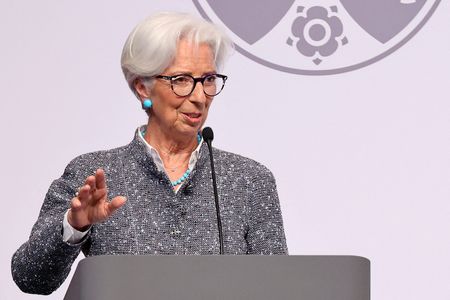 1
1 1
1
FRANKFURT, June 15 (Reuters) – The European Central Bank raised its key interest by 25 basis points on Thursday to 3.5% and left the door open to more hikes, extending its fight against high inflation even as the euro zone economy flags.
Following are highlights of ECB President Christine Lagarde’s comments at a news conference after the policy meeting.
NO WAGE-PRICE SPIRAL
“We are not seeing a second-round effect. We are not seeing this wage-price spiral… The sooner the better in terms of when do we bring inflation back to 2%, but we have also to be realistic and measured in the response that we give.”
INFLATION NOT COMING DOWN ENOUGH
“We will be as restrictive as long as needed in order to make sure that we reach that destination. Under the current parameters 2.2% in 2025 is not satisfactory and it’s not timely. Which is why we’re making the decisions that we are making today.”
PAUSE NOT DISCUSSED
“In terms of having to pause or having to skip – as I said, number one – we have not discussed it at all and we have not begun thinking about it because we have work to do.”
BROAD CONSENSUS
“It was quite a harmonious discussion and very good and thorough economic discussion. We went really deep into the analysis of the labour market and tried to really understand the forces behind inflation to better fight it and it was a very, very broad consensus.”
ON CORE INFLATION REVISION
“A lot of it is attributable to the unit labour cost. That’s a large chunk of the revision. The rest is … past upward surprises – it’s a different starting point, that is informed by data that came in after the least projection was made in May.”
LABOUR MARKET
“What we will continue to really monitor and dissect as well as we can is this entire enigma of the labour market which, as I said, is playing a critical role because many services – which are playing a large part in our economy – are labour intensive and wages in that respect play a key role.”
WE’LL KNOW TERMINAL RATE WHEN WE GET THERE
“I don’t want to comment about the terminal rate. The terminal rate is something that we will know when we get there. What is driving it (monetary policy) is the ultimate 2% (inflation) destination.”
INFLATION UPSIDE RISKS
“Upside risks to inflation include potential renewed upward pressures on the cost of energy and food also related to Russia’s war against Ukraine.
“A lasting rise in inflation expectations above our target or higher than anticipated increases in wages or profit margins, could also drive inflation higher including over the medium term. Recent wage agreements in a number of countries have added to the upside risks to inflation.”
JULY HIKE LIKELY
“Are we done? Have we finished the journey? No. We’re not at our destination. Do we still have ground to cover? Yes, we still have ground to cover.
“Bearing a material change to our baseline, it is very likely the case that we will continue to raise rates in July, which probably doesn’t come as a surprise. This is because we are determined to reach our target in a timely manner.
“We are not thinking about pausing, as you can tell.”
INFLATION
“Inflation has been coming down but is projected to be too high, for too long.”
GROWTH RISKS
“Downside risks to growth include Russia’s unjustified war against Ukraine and an increase in broader geopolitical tensions which could fragment global trade.”
MONETARY POLICY EFFECT
“Growth could also be slower if the effects of monetary policy are more forceful than projected.”
HIGH PROFITS
“Firms in some sectors have been able to keep profits relatively high especially where demand has outstripped supply.”
CLOSELY MONITORING INDICATORS
“Although most measures of longer-term inflation expectations currently stand at around 2%, some indicators remain elevated and need to be monitored closely.”
ON THE ECONOMIC OUTLOOK
“The outlook for economic growth and inflation remains highly uncertain.”
UNEVEN ECONOMY
“Conditions in different sectors of the economy are uneven. Manufacturing continues to weaken, partly owing to lower global demand and tighter euro area financing conditions, while services remain resilient.”
WAGE PRESSURES
“Wage pressures are becoming an increasingly important source of inflation.”
ECONOMY STAGNATES
“The euro area economy had stagnated in recent months.”
WEAK GROWTH
“Economic growth is likely to remain weak in the short run but strengthen in the course of the year as inflation comes down and supply disruptions continue to ease.”
(Reuters Global News Desk)